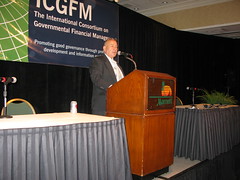ICGFM 24th Annual International Conference
May 16 - 21, 2010
Miami, Florida, USA
Conference Theme: Public Financial Management in the Era of “The New Normal”Deadline for submitting proposals: Monday, February 10, 2010.
Overview:The economic realities resulting from the worst financial crisis and ensuing global recession in 70 years include economic power shifting regionally, countries facing unprecedented debt loads as they try to manage out of large stimulus programs, more erratic revenue flows for mineral based economies, and unprecedented currency fluctuations. These new realities are commonly referred to as the “New Normal”. Public financial managers around the globe face new challenges as these realities impact revenues, budget priorities, debt management options, and calls for greater transparency and better links to performance.
Conference dates and location:
May 16 – 21, 2010
Marriott Biscayne Bay Hotel
1633 North Bayshore Drive
Miami, Florida 33132
USA
Conference description:
The ICGFM Annual International Conference is a gathering of financial management practitioners to discuss the financial reforms and methods available to better serve their citizens.
As we slowly enter a period of economic recovery, citizens, businesses, and civil society demand improved results in government expenditures, as well as increased accountability and transparency. This is even more critical as governments manage both declining revenues and large stimulus spending.
Representatives from Africa, Asia, Europe, Latin America, the Middle East and North America – 50+ countries in 2009 -- will gather in Miami to discuss public financial management in the era of the New Normal.
The ICGFM Annual International Conference will provide participants with an opportunity to learn from fellow practitioners on how to manage in this new environment, hear from development partners on how they are responding to new priorities, and to interact with colleagues on best practices and practical lessons being learned in the era of the New Normal.
During the first three days, the key themes and topics that will be addressed include:
- Expenditure management in a new economic environment
- New techniques in bringing transparency to public finance
- Debt and cash management challenges
- The expanding role and increasing responsibilities of public auditors
Addressing a post-stimulus environment - Utilizing technology such as social networking and XBRL to improve government performance
- Issues in human capital, including gender equality
- Stimulating private sector investment
- Utilizing Public Private Partnerships as a new tool
- The increasing need and opportunity to strengthen the internal audit function at all governmental levels
Submission process:
Submit your proposal in order to participate in the 24th Annual International Consortium on Government Financial Management (ICGFM) International Conference.
ICGFM is pleased to invite all country representatives and public financial management (PFM) practitioners to submit their presentation proposals for the 24th Annual ICGFM International Conference. The program committee is looking for country studies and other topics that will highlight the effective management of public funds in the era of the New Normal. We are particularly interested in case studies from your country or the experience of several countries.
- Does your country have an innovative approach to implementing its stimulus package?
- Has the global financial crisis affected your country’s efforts to implement PFM reforms?
- Has your country been able to maintain or increase foreign direct investment despite the worldwide recession?
- Can others learn from your experiences?
If so, we’re looking for you!
Format:
Please follow these instructions to ensure your proposal is expeditiously reviewed. Those that do not conform to these instructions will not be reviewed.
All submissions should be no more than 1-3 pages and must be submitted in English. The submission should include the following information.
Title of session
Type of session: Panel__ Presentation ___
Name, Title, Affiliation, languages spoken, address, email, and phone number of the Session Organizer
Name, Title, Affiliation, languages spoken and Contact information of up to four (4) potential panellists, if applicable
Overview that includes
Objectives of the session
Background of the topic
Significance to scholarship in or practice of PFM
Relevance to conference theme
Synopsis of presentation
Description of Session Format
Time/length of each presentation or remarks.
Type and length of interactive exercises (e.g. Question and Answer, demonstration, etc.)
Audio-visual aids (e.g., PowerPoint, handouts, video, etc.)
Any translation requirements
How to submit:
email proposals to proposals@icgfm.org
Method of selection
All submissions will be reviewed by the Program Steering Committee.
Criteria on which proposals are evaluated include: overall quality; interest to the financial management community of scholars; relevance to conference theme, and the potential to advance knowledge and dialogue in the field.
Selection notifications will be made by March 10th, 2010.
Final conference presentations from selected presenters are due on April 5th.
The top proposal presenters will be awarded a stipend toward travel and hotel expenses and given an opportunity to publish their case studies in the ICGFM Journal.
About ICGFM
Working globally with governments, organizations and individuals, the International Consortium on Governmental Financial Management is dedicated to improving financial management so that governments may better serve their citizens.
ICGFM was established more than two decades ago to serve as an international forum for public sector financial managers, with an emphasis on developing countries.
 Jason Levergood, Senior Manager at Grant Thornton LLP, provided an overview of the ICGFM Worldwide Survey, Public Financial Management Responses to an Economically Challenging World on December 7th. at the ICGFM Winter Conference. Public financial managements from over 50 countries were surveyed in 2010.
Jason Levergood, Senior Manager at Grant Thornton LLP, provided an overview of the ICGFM Worldwide Survey, Public Financial Management Responses to an Economically Challenging World on December 7th. at the ICGFM Winter Conference. Public financial managements from over 50 countries were surveyed in 2010.








